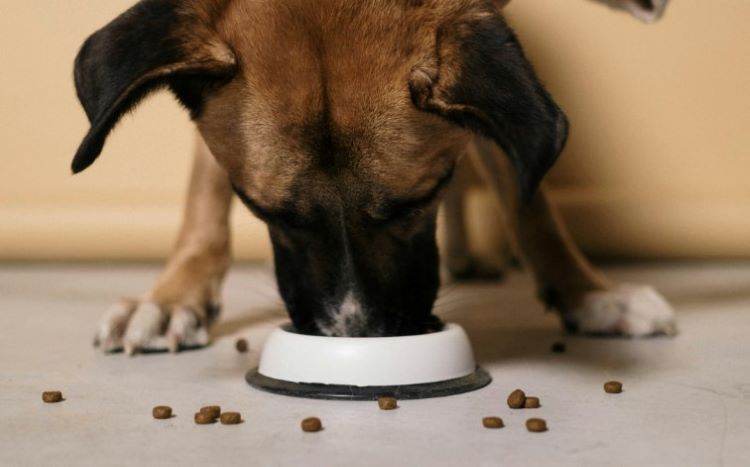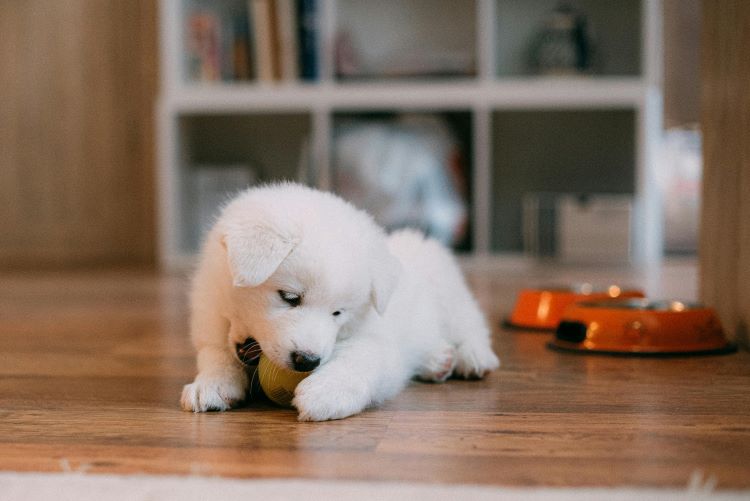Ready to help treat your pet to a healthy life?
How to Make Your Own Puppy Food (and Should You?)
By : Trupanion Staff | Published Jul 16, 2024

You want the best for your new puppy, right down to their diet. So, does this mean you should make your own food for them? While it may seem logical that a natural, homemade diet is more nutritious than ready-made formulas, there's a lot more to making homemade puppy food than meets the eye.
Knowing how to make your own puppy food and understanding doggy nutrition can help you ensure a balanced diet and decide whether DIY doggy food is something you want to take on. It’s also important to only make dog food under the guidance of your veterinarian — although homemade puppy food can be beneficial (when done right), it's often easier and safer for the average pet parent to purchase high-quality premade dog food for your growing pup.
Pros and cons of making your own dog food
Feeding your newest family member homemade puppy food may seem like a natural and appealing option compared to commercial diets. Nevertheless, meeting your puppy's nutritional needs is usually more challenging than it sounds.
Some DIY puppy food advocates may lead you to believe feeding a puppy is as simple as boiling some rice and adding some cooked chicken. But the truth is that dogs have more complex nutritional needs. This goes double for puppies, who need more calories than adult dogs as they’re still growing.
Puppies need the correct balance of fat, protein, carbohydrates, and minerals to achieve optimal growth. Optimal growth means growing at a healthy rate. A balanced diet also helps puppies develop healthy teeth, bones, muscles, and eyes. Failing to feed your puppy correctly could increase his risk of becoming overweight or underweight and developing certain health conditions.
Benefits of homemade puppy food
While feeding a puppy a homemade diet is a complex commitment, it may offer certain benefits. Making homemade puppy food allows you to tailor your pup's diet to suit his unique needs. This could be handy if your pet is allergic to ingredients found in commercial formulas.
If your puppy is a fussy eater, you can adapt your recipes to include foods he enjoys to reduce waste. Furthermore, you can prepare DIY food without the filler found in commercial foods.
Drawbacks of DIY puppy food
The primary drawback of feeding your puppy a homemade diet is that many recipes don't provide adequate nutrition for growing pups. A study by the University of California School of Veterinary Medicine found that 95% of homemade dog food recipes lacked sufficient levels of at least one vital nutrient, and 83% lacked multiple nutrients. DIY dog food recipes were often deficient in the following substances:
- Choline
- Vitamin D
- Zinc
- Vitamin E
Diets lacking essential nutrients can lead to major health issues, including reduced immunity and musculoskeletal problems. It's worth noting that this study examined recipes designed for adult dogs. Feeding a growing puppy an inadequate diet could cause even more serious health concerns.
Recipes devised by vets and certified nutritionists tended to have better content than those in recipe books and on websites. So, it may be worth paying an expert to help you create a homemade diet for your puppy.
Another factor to consider is the cost of making puppy food from scratch. While some people tout homemade puppy food as an affordable alternative to commercial diets, buying high-quality ingredients is often more expensive than prepared puppy formulas. You may also need to add supplements to your puppy's diet, further increasing the cost of DIY food. Generally, feeding your pup homemade meals takes more time and effort than buying commercial puppy food.

Homemade puppy food safety
Following some safety tips can help you avoid health problems when feeding your puppy home-cooked food. First, only use high-quality recipes created by animal nutrition experts. Consult your vet to ensure your puppy gets the nutrients he needs for healthy growth. Many puppy food recipes found on the internet contain vague instructions or unsuitable ingredients that could impact the food's nutritional profile.
Puppies and dogs have very different nutritional needs from humans. A common issue with homemade dog food is owners adapting recipes without understanding nutrition. For example, health-conscious owners may decide to use coconut oil instead of corn oil because they believe corn oil is unhealthy.
In reality, corn oil contains more linoleic acid, an omega-6 fatty acid essential for healthy growth and skin in dogs. Follow instructions from your vet or nutritionist unless you have professional knowledge of puppy dietary requirements.
Potential risks of homemade puppy food
Being aware of the potential dangers of homemade puppy food can help you make the best choices for your pet's health. Common issues include:
- Unsuitable ingredients — Many human-friendly foods, such as garlic, onions, nuts, and citrus fruits, are toxic to puppies and dogs.
- Vegan and vegetarian recipes — Dogs are omnivores, which means they eat plant-based foods and meat. Feeding a puppy or dog a vegan or vegetarian diet is not recommended.
- Exceeding safe nutrient levels — The main concern surrounding homemade puppy food is inadequate nutrition. However, some recipes may also surpass the safe upper limit for certain nutrients, such as vitamin D.
- Supplement issues — Most puppy and dog supplements are designed for use with commercial food. Therefore, they may not provide enough nutrients to keep your puppy healthy. If you're feeding your puppy a DIY diet, ask your veterinarian about supplements intended for use with homemade meals.
- Picky eating — Many DIY puppy food recipes call for diced ingredients. However, some puppies pick out their favorite foods and leave the rest of their meal, preventing them from getting a balanced diet. Processing your puppy's meals may encourage him to consume his entire meal.
- Unsafe storage — Just like human food, homemade puppy food can potentially cause food poisoning if you store it incorrectly. As a rule of thumb, place cooked puppy food in an airtight container. Sealed meals usually last 2 to 3 days in the fridge or 2 months in the freezer.
- Raw food — Raw food is popular for adult dogs, although the American Veterinary Medical Association recommends avoiding feeding animals raw or undercooked foods because they may contain pathogens. Raw meat diets may pose a higher risk to puppies because younger animals have less developed immune systems.
Nutritional guidelines for DIY puppy food
Getting the correct quantities of essential nutrients is crucial for keeping your puppy healthy. Nutritional needs vary by age and breed, but most puppy foods follow these guidelines:
- Protein — Puppies need more protein than adult dogs to support rapid growth. Puppy food should contain 22% to 32% protein.
- Calcium — Calcium requirements vary by breed. Small and medium breed puppies typically need food containing 0.7% to 1.7% calcium, while larger breeds need more precise levels. Ask your vet how to ensure large or giant breeds get the right amount of calcium.
- Carbohydrates — Generally, puppies need food containing around 20% carbohydrates to ensure healthy growth.
- Fat — Feeding your puppy food containing 10% to 25% fat can reduce the risk of obesity and musculoskeletal problems while providing enough energy.
The Association of American Feed Control Officials regulates commercial puppy foods to ensure they contain the correct nutritional profile. The easiest way to provide your puppy with the best nutrition is to feed him high-quality, AAFCO-certified puppy food.
Large and giant breeds have different nutritional needs, and you can buy AAFCO-approved products to suit your pup.

DIY puppy food recipes
The best homemade puppy food recipe for your pet depends on various factors, including the dog's age, breed, and health status. Generally, you can consider using the following ingredients to make puppy food at home:
- Cooked chicken, turkey, fish, and other animal proteins
- Carrots, peas, and other dog-safe fruits and vegetables
- Vegetable oil
- Rice, potatoes, and other carbohydrates
- Puppy-friendly nutritional supplements purchased from reputable manufacturers
Your vet may provide puppy food recipes to suit your pup's unique requirements. Or online services, such as Balance It, allow you to create personalized meal plans for your puppy's age and breed. Some services provide recipes approved by certified veterinary nutritionists, and you should follow the preparation instructions precisely.
Whether to prepare homemade puppy food for your pet is a personal decision, but it's essential to understand your puppy's nutritional needs and get expert help to prevent health problems. Whether or not you feed your pet a homemade diet, be sure to check in regularly with their veterinarian.
Now's also the ideal time to protect your growing puppy with a dog insurance policy. Insuring your pet while they’re still young is recommended for getting the most value out of your coverage.
Trupanion does not receive compensation for any third-party products or services mentioned in this article. External links are for informative purposes only and do not reflect any current partnerships or campaigns.
